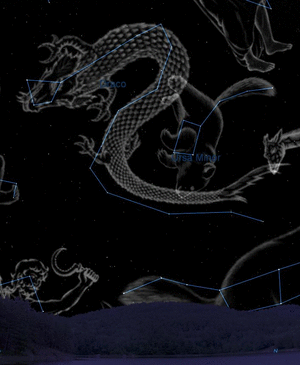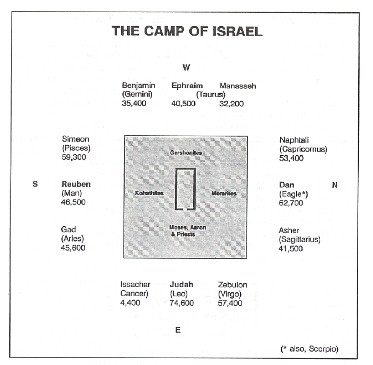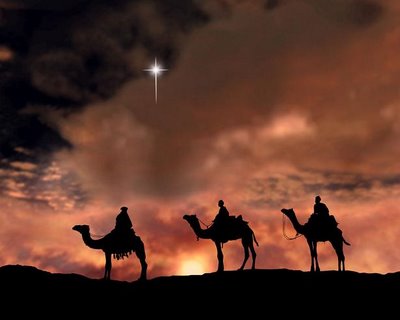I believe everybody here is looking in the wrong place!
I will make 2 points to begin with.
1. Astrology is always spoken of in negative terms in scripture. See the very good article on this website.
http://www.godandscience.org/doctrine/a ... IZhKsymzeq Why would God use Astrology to point people to his own Son? Yet this is what most people here appear to be arguing.
2. The passage in Matthew makes it quite clear that the star itself moved and guided the Magi specifically to where Jesus was. How could heavenly bodies do this? See below:
Matthew 2:9-10 (New International Version)
After they had heard the king, they went on their way, and the star they had seen in the east went ahead of them until it stopped over the place where the child was. When they saw the star, they were overjoyed.
The most plausible explanation I have come across comes from an Arnold Fruchtenbaum, a Messianic Jew. I wrote the piece below some time ago, and it is a combination of Arnold's teaching, some other information I have picked up and one or two of my ideas. See what you think.
Matthew 2:1f
Jesus was born in the town of Bethlehem in Judea, during the reign of King Herod. About that time some wise men [Magi, Astrologers] from eastern lands arrived in Jerusalem, asking,"Where is the newborn king of the Jews? We have seen his star as it arose, and we have come to worship him." Herod was deeply disturbed by their question, as was all of Jerusalem. He called a meeting of the leading priests and teachers of religious law. "Where did the prophets say the Messiah would be born?" he asked them. "In Bethlehem," they said, "for this is what the prophet wrote: 'O Bethlehem of Judah, you are not just a lowly village in Judah, for a ruler will come from you who will be the shepherd for my people Israel.' " Then Herod sent a private message to the wise men, asking them to come see him. At this meeting he learned the exact time when they first saw the star. Then he told them, "Go to Bethlehem and search carefully for the child. And when you find him, come back and tell me so that I can go and worship him, too!"
After this interview the wise men went their way. Once again the star appeared to them, guiding them to Bethlehem. It went ahead of them and stopped over the place where the child was. When they saw the star, they were filled with joy! hey entered the house where the child and his mother, Mary, were, and they fell down before him and worshiped him. Then they opened their treasure chests and gave him gifts of gold, frankincense, and myrrh. But when it was time to leave, they went home another way, because God had warned them in a dream not to return to Herod.
This must be one of the strangest passages in the gospel according to Matthew. Leaving aside what many already know - there were not necessarily 3, what the 3 gifts stood for etc, there are several questions with no clear answers, as follows:
1. How did they know about the King of the Jews?
2. Assuming they were gentiles, why did they care?
3. How did they know the star was his star?
4. What was the star?
5. Given what the Bible says elsewhere, why do astrologers get a good press?
6. We can understand Herod's reaction, but why was Jerusalem deeply disturbed?
7. Why is this all related in Matthew, which is supposed to be aimed at the Jews?
It is well worth thinking through this one, as the answer gives us some interesting insights.
How did they know, and why did they care?
Daniel was always associated with Babylonian astrologers (
Daniel 1:19-20; 2:12-13, 47; 4:7-9; 5:11-12). Nebuchadnezzar, not realizing that the source of Daniel's ability was not the stars of the heavens but the God of Heaven, made Daniel the head of all the astrologers of Babylon. As Daniel eventually also saved the lives of these astrologers - by interpreting Nebuchadnezzar's dream - there is little doubt that he was able to lead many of them to turn away from the worship of the stars to begin worshipping the God of Israel.ӬӬSo, then, a line of Babylonian astrologers spanning generations worshipped the true God, and having Daniel's prophecy, looked forward to the coming of the King of the Jews. We can conclude from the Book of Daniel, then, that Babylonian astrologers did know the time Messiah was to be born. Hence the '
Seventy Sevens' of
Daniel 9:24. However, Daniel says nothing about a star that would herald Messiah's birth.
How did they know it was His star?Ӭ
To find the answer, we must go back even earlier in the Old Testament to the prophecies of Balaam. Balaam was hired by the king of Moab to curse the Jews. He attempted to do so four times, and each time God took control of his mouth so that he ended up blessing the Jews instead. In the course of these blessings, he sets forth four key Messianic prophecies. One of these is found in
Numbers 24:17
ӬӬI see him, but not now; I behold him, but not nigh: There shall come forth a star out of Jacob, And a sceptre shall rise out of Israel, And shall smite through the corners of Moab, And break down all the sons of tumult.ӬӬ
Much to his own regret, Balaam was forced by God to prophesy of the coming of the Jewish Messiah, which he related to a "star." But this is not a literal star, because it says, "
And a sceptre shall rise out of Israel." The star and the sceptre in this text are one and the same. (We know this because the prophecy is in the form of Hebrew poetry, which is not based on rhythm or rhyme but on parallelism.) And the term "sceptre" is a symbol of royalty or kingship. This star, that would rise out of Jacob, is himself a king.ӬӬFurthermore, Balaam's occupation was that of an astrologer. Even more significant is that he came from Pethor, a city on the banks of the Euphrates River in Babylonia (
Numbers 22:5; Deuteronomy 23:4). With the Book of Daniel and the prophecy of Balaam, we have a double Babylonian connection here. Hence, the revelation of a star in relation to Messiah's birth came via a Babylonian astrologer who, no doubt, passed the information down to his colleagues. Centuries later, Daniel was able to expound to the Babylonian astrologers as to the time that "the star of Jacob" would come.ӬӬ
So is the Bible giving astrology a “good press”?
The Magi knew not by gazing at the stars through the pseudo-science of astrology, but by revelation of God as contained in the Scriptures through the prophecies of Balaam and Daniel. The story of the Wise Men gives no validity to astrology whatsoever.ӬӬ We actually have here the
opposite of Astrology. In Astrology, the position of the stars affects the person. Here, the position of Jesus affected the star!!
Interestingly, the three types of gifts given to Jesus by the Wise Men are full of Old Testament symbolism. Gold is the symbol of royalty or kingship, emphasizing that Jesus is a king. Frankincense - part of the special scent burned on the altar of incense within the holy place as well as the smoke penetrated into God's presence in the Holy of Holies itself - was a symbol of deity. Frankincense affirms Jesus as God. Myrrh was associated in the Old Testament with death and embalming.
So what exactly was the star?
Obviously, this star is something different, but what? The Greek word for "star" simply means "radiance" or "brilliance." With this star coming in the form of a light, we have the appearance of the Shechinah Glory - the visible manifestation of God's presence. Whenever God became visible in the Old Testament, such a manifestation was referred to as the Shechinah Glory. This manifested most often in the form of a light, fire, cloud or some combination of these three things. And, so, in Babylon appears a light, a brilliance, a radiance that may look from a distance like a star but has actions and characteristics that no star can or does. What these Wise Men actually saw was the Shechinah Glory, and they deduced that it was a signal that the King of the Jews had finally been born.
Why was "all of Jerusalem" deeply disturbed?
1. A small (or even a biggish) bunch of easterners would not normally cause a stir in Jerusalem - something akin to a "tourist" trap anyway - any more than they would in present day Durham or York. Something more significant would have to be happening.
2. Judea was close to the edge of the Roman Empire. Not only was Herod ageing, but his province bordered the rival Parthian empire.
3. There is plenty of info about the Magi from archaeological finds, as well as the Bible. The Babylonians were good record keepers. Firstly, they were a priestly class (as the Levites were in Israel and the Brahmin caste in Hinduism) from the Medes [from whom the present day Kurds are probably descended from].
4. They were used by Kings in Persia, Media, Babylonia etc as senior advisors. Esther chapter 1 names some of them and refers to the laws of the "Medes and Persians" which cannot be revoked.
5. Priests and Kings frequently work in tandem. Samuel (actually an Ephraimite and a Nazirite who worked closely with the priests at that time) was the "Kingmaker" of Saul and David. Thereafter, the high Priest acted as "Kingmaker" for the Kings of Judah. Even today, our Archbishop of Canterbury anoints our Constitutional Monarch on Coronation day. Very important point, this. The Magi were King-Makers. This, I believe is the main reason why Matthew used this in his Gospel. It is surely a rebuke to the Jewish people that God used gentiles to acknowledge Christ as the King of the Jews. The whole thing bypassed the Jewish chief priests and scribes.
Forget what your Christmas card illustrations say! The Magi used horses, not camels!!! And those three lonely figures never existed. The Magi's importance meant that they would be accompanied by a bodyguard of a thousand persian cavalry. Now you know why Jerusalem was alarmed....and Herod even more so!
"Erm, Joseph, Mary, there's some people at the door - want to see your little boy!" Replace your mental picture of a bunch of foreign tourists in York with a huge motorcade arriving unannounced from a foreign empire....
Why is this all related in Matthew, the most Jewish of the Gospels?
Now bear in mind that Matthew was writing possibly the earliest gospel to Jews who had been scattered from Jerusalem (
Acts 8:1f) throughout the surrounding areas. This incident would be within living memory of some of the readers. Matthew is saying, "Remember the time all those years ago...." and reminding his readers that these people had come to acknowledge the coming of the King of the Jews - the theme of his book.
Now there's some material to be going on with if you're stuck for a seasonal sermon.....!
With thanks to Ariel Ministries,
http://www.ariel.org/








